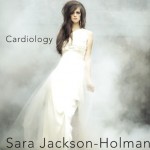Things have been moving awfully fast over the past couple of years for talented young Sara Jackson-Holman. The story is fairly well known: about her casually opportune interaction with Anthony McNamer, head of Expunged Records—Blind Pilot’s label—via her random post on the band’s fan page. Subsequently McNamer arbitrarily checked out Sara’s MySpace page, where she had posted home recordings of a few of her songs, a decision that eventually led to her signing on with the record company without the benefit of so much as a demo. Ah, kismet!
In May of 2010 under the guidance of Blind Pilot producer Skyler Norwood, Sara released When You Dream, her debut album on the Expunged label. Seemingly within weeks “Into the Blue” a song from that album was chosen as soundtrack for the climactic last scene of the Season 2 finale of the ABC series Castle wherein Beckett is forced to confront Castle’s apparent emotional indifference toward her and their relationship (or so I gather online, I’ve never seen the program). Sara’s halting ballad—her fluttery vibrato all slippery quivery, with sad strings sobbing behind her—melted hearts across the nation, the song standing on it’s own musical merits, while carving her name into the hearts of thousands.
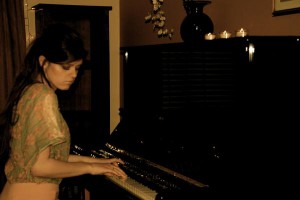 Though songwriting is a relatively new component in her musical career, Sara has a background in classical piano. She was studying music and writing at Whitworth University when her career had its auspicious inauguration. She had only been writing songs two years and had no previous studio experience when her first album was released. In short order she learned about the music business: how the music is created, and the wheels of commerce that turn behind it.
Though songwriting is a relatively new component in her musical career, Sara has a background in classical piano. She was studying music and writing at Whitworth University when her career had its auspicious inauguration. She had only been writing songs two years and had no previous studio experience when her first album was released. In short order she learned about the music business: how the music is created, and the wheels of commerce that turn behind it.
When You Dream was met with moderate public acclaim—enough so that laying the groundwork for her sophomore effort was begun almost immediately. Over the ensuing year, Sara spent her time immersed in the songwriting craft. Still in her early twenties, she began to think for the first time in terms of the scope and sphere of music production and the studio experience, creating several dense, multi-track demos at home, which she brought to this project.
Along with Sara’s increased input, Skyler Norwood has returned to the producer’s chair for Cardiology. In addition, Keith Schreiner (Auditory Sculpture, Dahlia) is on board to contribute beats and synth programming. He also had a hand in producing several of this album’s stronger tracks (there aren’t actually any weak ones).
The result is a natural progression from the previous record, yet a bit of a jarring departure at the same time. What was classical folk pop keyboard flavored music has evolved here into technoclassical popfolk electronica. It’s not at all heavy-handed in execution. But Sara Jackson-Holman’s music is all about nuance and subtlety. Any new addition creates a stylistic domino-effect that reverberates through the entire project.
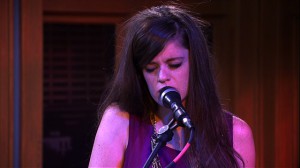 We begin with “Cartography” a moody, slow moving number ornamented with wheezing organ, wincing splinters of keyboard accent, humming synth, and watery washes of treated piano. From that, Sara’s uncertain vocal unfurls in “Copper fields and half dreamt dreams…” a sleepy confession of infatuation. “Cut the corner, circle round/Where you are then I am found.”
We begin with “Cartography” a moody, slow moving number ornamented with wheezing organ, wincing splinters of keyboard accent, humming synth, and watery washes of treated piano. From that, Sara’s uncertain vocal unfurls in “Copper fields and half dreamt dreams…” a sleepy confession of infatuation. “Cut the corner, circle round/Where you are then I am found.”
In singing that line Sara gives indication that she be may be suffering the initial stages of the dreaded Colin Meloy “Affected Enunciation Disease,” an impediment—which, if left unchecked—can become, as Mister Meloy will attest, almost impossible to fully eradicate. Take steps now, Sara. This disease is preventable. Don’t do it. It’s a bad habit. A lovely braid of harmony vocals wrap around the sweet chorus of this delicate, if directionally indeterminate number.
“Can’t Take My Love” has a distinct soul vibe at its core. Vocally, Sara renders a fair assimilation of Macy Gray’s “I Try,” with a touch of Aretha’s “Until You Come Back to Me.” Over mechanical drums and drippy piano drops, brooding cello and violin cry—winding tensile tension with swelling intensity. Across that, Sara’s snaky vocal slithers through the verses, before opening up in a chorus that calls to mind Fiona Apple and Annie Lennox.
Yeah. Annie Lennox. That’s accurate. There are comparisons to the Eurythmics and “Here Comes the Rain” that could be made here. A little zippier arrangement or a tarted up re-mix and this is a totally mainstream radio-friendly hit song, not that it isn’t radio friendly already.
Befitting of her penchant for classical music, echoes of Beethoven’s “Für Elise” serve as thematic inspiration for the intro and chords to “For Albert,” one of a number of songs written in response to the recent passing of Sara’s grandfather. After a brief, solemn intro, the song busts out into a full-on mini-simulation of Giorgio Moroder-gilded disco sensibility. Or a reasonable facsimile thereof, given our distant proximity to that era at this advancing date. The ironic drum machine-like snare is a nice touch. There is an Adele meets Florence and the Machine quality about this song. The Eurythmics are circulating through as well.
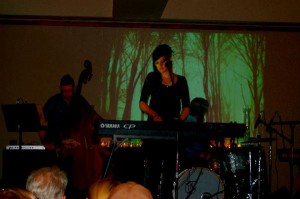 The lush “Freight Train” is a ballad dappled with piano and emotive strings—another tribute to her grandfather. Elegaic. Feist and Norah Jones come to mind as vocal/musical references. A piquant little gem of a song. The Schreiner produced ballad “Break My Heart” feels a little like the Eurythmics’ “Sweet Dreams” (without the driving synth riff). Kate Bush and latter-day Tori Amos come to mind as vocal references in the chorus. Nice.
The lush “Freight Train” is a ballad dappled with piano and emotive strings—another tribute to her grandfather. Elegaic. Feist and Norah Jones come to mind as vocal/musical references. A piquant little gem of a song. The Schreiner produced ballad “Break My Heart” feels a little like the Eurythmics’ “Sweet Dreams” (without the driving synth riff). Kate Bush and latter-day Tori Amos come to mind as vocal references in the chorus. Nice.
Julee Cruise’s theme from Twin Peaks could serve as the model for “Empty Arms.” A stumbling low synth figure bounces ungainly as Sara vocally evokes Leslie Feist with a haltingly understated vocal delivery. Somber but uplifting—in a determined sort of way. Skyler Norwood’s production of “To Be Bright,” is (over?) wrought with white noise gunshot beats. Those beats tend to get in the way of an awful lot of cool sonic information and may not be necessary to the betterment of the song. Otherwise, Fiona Apple and Adele meet Kate Bush over at the Eurythmics’ house. Great song.
With just voice and solitary unadorned piano, “Oh My Honey” seems more indicative of who Sara Jackson-Holman really is, behind the sheer veils of studio “magic.” “Come By Fire” is similar in construct—but for the sightest coloration near the end of the tune. More than any others found here, those two songs hearken back to the first album.
Drippy hollow-log synth tones set the mood for “Risk It All,” before the song slips into the bluesy soul-essence feel as heard on “Can’t Take My Love.” Driven by gurgling synths, and schizophrenic drum patches (it may be Skyler Norwood on drums—but they sound treated), Sara purrs and coos like Macy Gray. It’s a new vocal style she’s trying on here, so she’s not self-assured in the presentation. But just the same, Sara has hit upon a sound that could work for her going forward. She could easily out-Adele Adele at some near future date. Schreiner’s burbling synth line in the chorus is nicely executed.
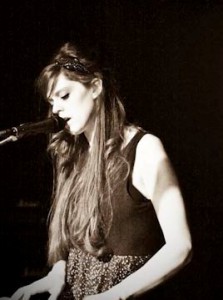 Another hit in the making is the Schreiner produced “My Biggest Mistake.” The song dithers around in the verses, stuttering on crazy syncopated drum beats before busting out on an especially memorable chorus. Here, Sara registers one of her strongest, most original vocal performances. A harbinger of what she’s capable of attaining. Annie Lennox again comes to mind, in Sara’s clipped phrasing in the chorus, especially.
Another hit in the making is the Schreiner produced “My Biggest Mistake.” The song dithers around in the verses, stuttering on crazy syncopated drum beats before busting out on an especially memorable chorus. Here, Sara registers one of her strongest, most original vocal performances. A harbinger of what she’s capable of attaining. Annie Lennox again comes to mind, in Sara’s clipped phrasing in the chorus, especially.
“Do I Make It Look Easy?” is one of the best creations of the set—an Appleish minor key piano prance. And finally, producer Norwood provides a real, big-beat, drum kit which lends considerable oomph to the proceedings. Compared to the other songs, it sounds like arena rock! Sara contributes a fine vocal— maybe: Apple meets Macy Gray. Sneaky sassy. Nicely done.
A moody, tender ballad “Cardiology” is very pretty, but is marred by a rather annoying martial beat. Sad synth figures fill out the peripheries, while the center ripens with angelic vocal harmonies and slow, pizzicato heartstrings, melding with the melodic bark of a wounded synth flute.
Impeccable, pristinely sparse, understated arrangements are rife on Cardiology. But, at the same time they are sort of solemn, sterile and gloomy: morose. So, for the most part everything has this depressed, desolate Portishead-like sensibility. Sullen landscapes, thirteen shades of Sara gray.
But her musical influences would seem broader than a scale from black to white. Here she presents a highly stylized sound—quirky synths, no guitars whatsoever, string and piano accoutrements, electronic-like drums and/or hyperactive percussive support: not always a solid foundation upon to which the real substance of Sara’s songs might rest. This is especially true on some of her more soul oriented songs. But this will be the sort of choice Sara will confront as her career progresses. Who does she want to be? How does she want to sound?
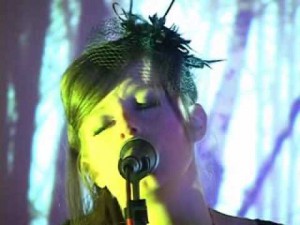 Sara Jackson-Holman is a minor-key soul, no doubt. And, still being new to all this, she is not yet fully actualized as an artist. She’s still maturing, still developing a musical style and vocal persona. Just the same, the essence of a major talent is right at hand. Even with lyrics more cerebral than most pop works, Sara is quite capable of producing a hit song. She seems destined for big things. Any day now, for that matter. And when success befalls her, she can then make all of her choices on a grander scale, with a wider palette from which to choose colors for her accessibly charming music.
Sara Jackson-Holman is a minor-key soul, no doubt. And, still being new to all this, she is not yet fully actualized as an artist. She’s still maturing, still developing a musical style and vocal persona. Just the same, the essence of a major talent is right at hand. Even with lyrics more cerebral than most pop works, Sara is quite capable of producing a hit song. She seems destined for big things. Any day now, for that matter. And when success befalls her, she can then make all of her choices on a grander scale, with a wider palette from which to choose colors for her accessibly charming music.


